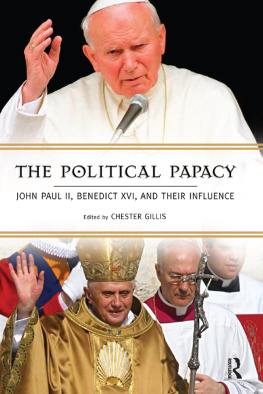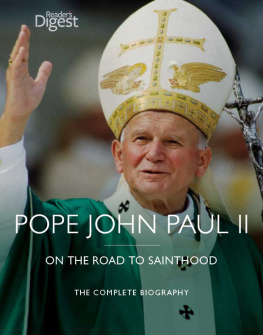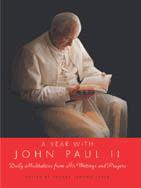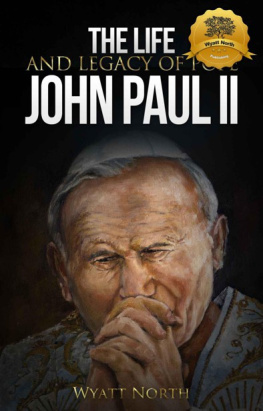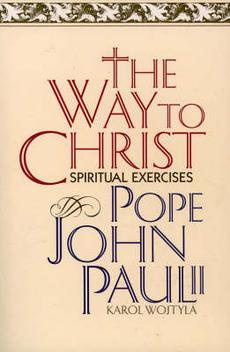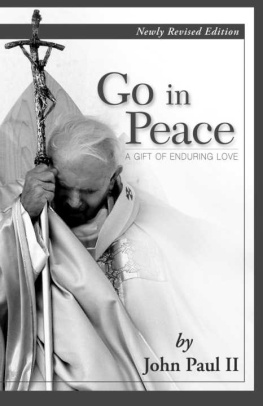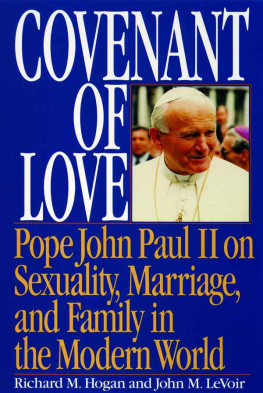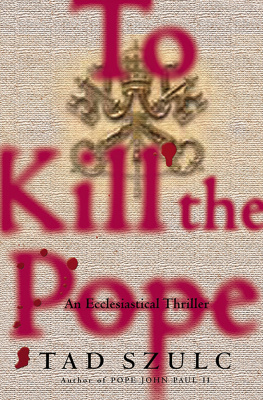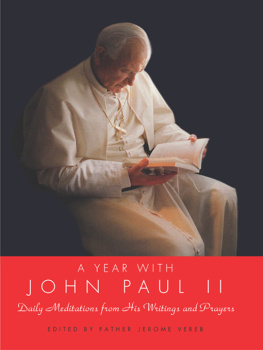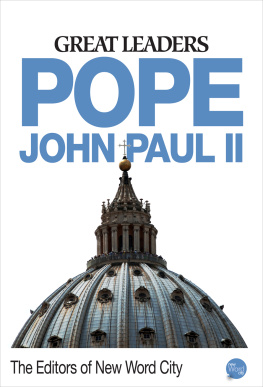The Political Papacy
The Political Papacy
John Paul II, Benedict XVI,
and Their Influence
Edited by
CHESTER GILLIS

First published 2006 by Paradigm Publishers
Published 2016 by Routledge
2 Park Square, Milton Park, Abingdon, Oxon OX14 4RN
711 Third Avenue, New York, NY 10017, USA
Routledge is an imprint of the Taylor & Francis Group, an informa business
Copyright 2006, Taylor & Francis.
All rights reserved. No part of this book may be reprinted or reproduced or utilised in any form or by any electronic, mechanical, or other means, now known or hereafter invented, including photocopying and recording, or in any information storage or retrieval system, without permission in writing from the publishers.
Notice:
Product or corporate names may be trademarks or registered trademarks, and are used only for identification and explanation without intent to infringe.
Library of Congress Cataloging-in-Publication Data
Gillis, Chester, 1951
The political papacy : John Paul II, Benedict XVI, and their influence / Chester Gillis.
p. cm.
Includes bibliographical references and index.
ISBN 1-59451-181-0 (hc : alk. paper)
1. John Paul II, Pope, 19202005Political activity. 2. Benedict XVI, Pope, 1927 Political activity. 3. PopesPolitical
activityHistory20th century. I. Title.
BX1878.5.G55 2005
282.092dc22
2005027854
Designed and Typeset by Hoffman-Paulson Associates
ISBN 13: 978-1-59451-181-3 (hbk)
Contents
, Jo Renee Formicola |
John L. Allen Jr. |
John Paul II |
, Carl Bernstein |
, Ernest Evans |
, Joseph Ratzinger |
, John Paul II |
, Derek S. Jeffreys |
, Ren Coste and Rosemary A. Peters |
, John Paul II |
, John Paul II |
, John Paul II |
, John Paul II |
, Benedict XVI |
, Benedict XVI |
, Benedict XVI |
, Yehezkel Landau |
, Benedict XVI |
, Ibrahim M. Abu-Rabi |
, Benedict XVI |
, John Paul II |
, John Paul II |
, Angelo Sodano |
, Robert Grant |
, John Paul II |
, Benedict XVI |
, Gretchen Vogel |
, Michael Griffin |
Even the most casual observer would probably agree that popes function as political figures as well as spiritual leaders. Historically, some have been more politically inclined and active than others, but all have had influence on societies, cultures, and public policies. During the earliest development of the church, their influence affected a relatively small community of believers. Nevertheless, in the view of Roman overlords, these believers posed a threat to Roman rulea perception that resulted in persecution. As the numbers of Christians increased, so did papal influence. With the rise of Constantine in the early fourth century C.E., the church gained recognition from the state, thus enhancing its influence.
Since that time, popes, regardless of their personal piety or lack thereof, have played important roles in the social, cultural, and political order. In the Middle Ages and the Renaissance, they crowned kings. This power underscored both the divine right of kings and the churchs authority. They also had the power to influence culture. For example, Julius II commissioned Michelangelo to paint the Sistine Chapel. Despite the fact that Julius mistreated this distinguished artist, enduring art resulted. Popes owned principalities, advised monarchies, established moral codes, governed educational institutions, served as patrons of music and art, and fought warsall in the name of the church. Their decisions and the directions they took influenced the religious, social, cultural, and political landscape. Until the twentieth century, the Vatican owned considerable landholdings that made it an economic and political power.
Some popes apprenticed themselves for the role of supreme pontiff by virtue of their membership in the papal diplomatic corps, representing the Holy See in various parts of the world. For example, Pius XII (Eugenio Pacelli) served as Papal Nuncio to Germany and as Vatican Secretary of State before becoming pope in 1939. Others learned their skills from papal mentors, as in the case of Joseph Cardinal Ratzinger, who, when he headed the Vatican Congregation of the Doctrine of the Faith, served as one of John Paul IIs closest confidants.
Some pontiffs, however, have had more political influence than others. John Paul II counts among these. A pious man nominated for sainthood soon after his death, he understood and capitalized on the political nature of his office. His biography, in part, explains his political interests. Karol Wojtyla grew up in Poland, then a country occupied by the Nazi regime. Following World War II, he and his fellow Poles suffered under communist rule. They longed for independence and freedom but chafed under an oppressive foreign regime. In the communist era, many Polish people collaborated with their Russian overlords, causing division and mistrust. The Catholic Church walked a fine line between resistance and capitulation.
Growing up in preWorld War II Poland, Wojtyla befriended ostracized Jews, who were fellow Poles unfairly singled out for punishment by a racist Nazi regime. In his view, his acts were likely more humanitarian and Christian than political, but they contributed to a political philosophy that opposed oppression wherever it occurred and championed national self-determination and human rightsdispositions that carried over to his papacy.
Benedict, only seven years younger than his predecessor John Paul II, also grew up under the Nazi regime, and, since he was a German citizen, his experience of oppression was more direct. Forced to join Hitlers youth corps when he was fourteen years old, Joseph Ratzinger experienced the horrors of a dictatorship early in his life. Again unwillingly, he served briefly in Hitlers army and then deserted. How could such experiences not shape the view of totalitarianism and absolute political power for these future popes?
Once elected, all pontiffs recognize that they have the responsibility to make pronouncements with political implications since silence might mean a lost opportunity. At the same time, they must do so thoughtfully and carefully, often balancing the churchs diplomatic needs and the gospels demand to be prophetic. What a pope says is important because, as the leader of more than one billion Catholics, he commands the most significant international religious voice in the world. What he says is reported in the press all over the world. And what he says goes beyond pious platitudes. By his pronouncements, he attempts to influence public policy, other religions, governments, believers, and nonbelievers alike.
When a pope speaks out against war, stem-cell research, abortion, same-sex marriage, capital punishment, or contraception, the press often describes these as social issues, and indeed they are. However, in the churchs view these constitute not just social issues but also
Next page
